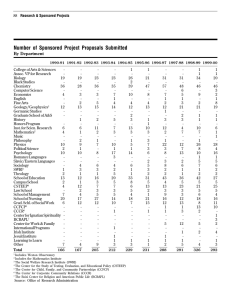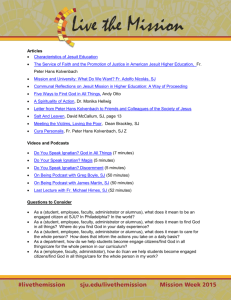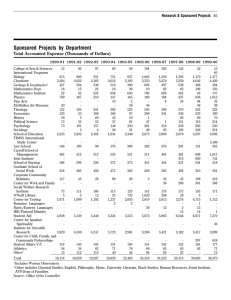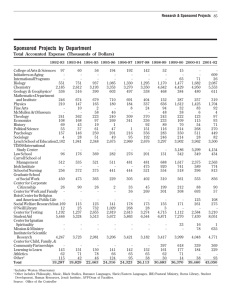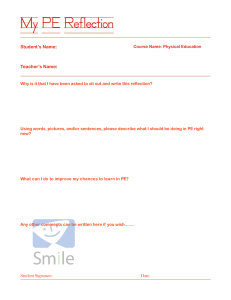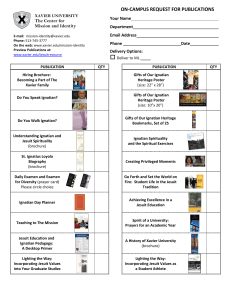* Ignatian Pedagogy A Practical Approach
advertisement
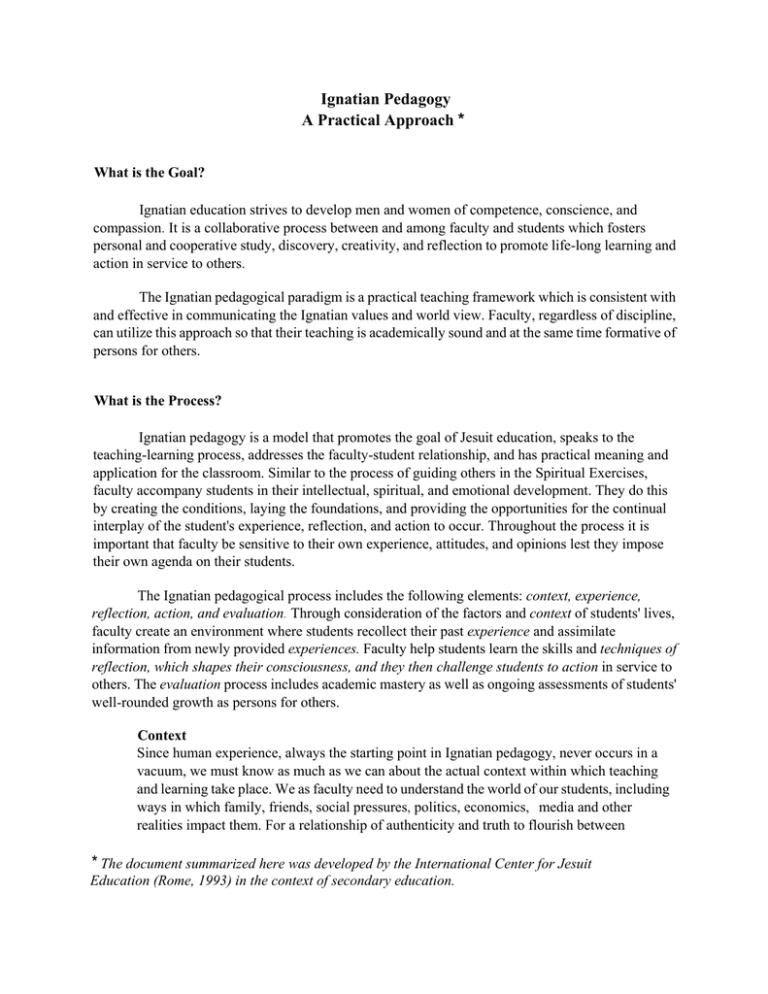
Ignatian Pedagogy A Practical Approach * What is the Goal? Ignatian education strives to develop men and women of competence, conscience, and compassion. It is a collaborative process between and among faculty and students which fosters personal and cooperative study, discovery, creativity, and reflection to promote life-long learning and action in service to others. The Ignatian pedagogical paradigm is a practical teaching framework which is consistent with and effective in communicating the Ignatian values and world view. Faculty, regardless of discipline, can utilize this approach so that their teaching is academically sound and at the same time formative of persons for others. What is the Process? Ignatian pedagogy is a model that promotes the goal of Jesuit education, speaks to the teaching-learning process, addresses the faculty-student relationship, and has practical meaning and application for the classroom. Similar to the process of guiding others in the Spiritual Exercises, faculty accompany students in their intellectual, spiritual, and emotional development. They do this by creating the conditions, laying the foundations, and providing the opportunities for the continual interplay of the student's experience, reflection, and action to occur. Throughout the process it is important that faculty be sensitive to their own experience, attitudes, and opinions lest they impose their own agenda on their students. The Ignatian pedagogical process includes the following elements: context, experience, reflection, action, and evaluation. Through consideration of the factors and context of students' lives, faculty create an environment where students recollect their past experience and assimilate information from newly provided experiences. Faculty help students learn the skills and techniques of reflection, which shapes their consciousness, and they then challenge students to action in service to others. The evaluation process includes academic mastery as well as ongoing assessments of students' well-rounded growth as persons for others. Context Since human experience, always the starting point in Ignatian pedagogy, never occurs in a vacuum, we must know as much as we can about the actual context within which teaching and learning take place. We as faculty need to understand the world of our students, including ways in which family, friends, social pressures, politics, economics, media and other realities impact them. For a relationship of authenticity and truth to flourish between * The document summarized here was developed by the International Center for Jesuit Education (Rome, 1993) in the context of secondary education. faculty and student, there has to be built a mutual trust and respect that grows out of a continuing experience of the other as genuine companion in learning. We need to know how to create an atmosphere for learning where we help one another and work together with enthusiasm and generosity, attempting to model concretely in word and action the ideals we uphold for our students and ourselves. Experience Experience for Ignatius meant to "taste something internally" which involves the whole person - mind, heart, and will - because without internal feeling joined to intellectual grasp, learning will not move a person to action. To enhance learning, we faculty should first create the conditions whereby students gather and recollect the material of their own experience in order to distill what they already understand in terms of facts, feelings, values, insights, and intuitions related to the subject matter at hand. Later we guide students in assimilating new information and further experience so that their knowledge will gain in completeness and truth. We select activities that take students beyond rote knowledge to the development of the more complex learning skills of understanding, application, analysis, synthesis, and evaluation. Through an eclectic mix of direct activities (such as conversations and discussions, simulations, role plays, laboratory investigations, field trips, service projects, etc.) and vicarious activities (reading, listening to a lecture, etc.), we strive to create learning experiences that involve the cognitive as well as affective responses, having students consider the questions, "What is this?" and, "How do I react to it?" We also help students integrate learning experiences in the classroom with those of home, work, peer culture, etc. Reflection Reflection and discernment were integral parts of Ignatius' learning process. Reflection is a thoughtful reconsideration of some subject matter, experience, idea, purpose or spontaneous reaction, in order to grasp its significance more fully. Thus, reflection is the process by which meaning surfaces in human experience by: understanding the truth being studied more clearly; understanding the sources of one's sensations or reactions in the consideration; deepening one's understanding of the implications for oneself and others; achieving personal insights into events, ideas, truths or the distortion of truth; coming to an understanding of who I am ... and who I might be in relation to others. Reflection is a formative and a liberating process which forms the conscience of learners in such a manner that they are led to move beyond knowing, to undertake action. Faculty lay the foundations for "learning how to learn" by engaging students in the skills and techniques of reflection. A major challenge to faculty is to formulate questions that will broaden students' awareness and impel them to consider viewpoints of others. Action For Ignatius, love is shown in deeds not words. Faculty hope that students are impelled to move beyond knowing to action−action that is for the welfare of society. It is our role as faculty to see that opportunities are provided that will challenge the imagination and exercise the will of the students to choose the best possible course of action to flow from and follow up on what they have learned. Through experiences that have been reflected upon, students make the truth their own and serve others. Faculty help students to consider their experience from a personal, human point of view, while remaining open to where the truth might lead. Evaluation Ignatian pedagogy aims at formation, which includes but goes beyond academic mastery. Here we are concerned about students' well-rounded growth as persons for others. Traditional ongoing academic evaluation can alert faculty to possible needs for use of alternative methods of teaching; it also offers special opportunities to individualize encouragement and advice for academic improvement for each student. On the other hand, periodic evaluation of the student's growth in attitudes, priorities, and actions consistent with being a person for others is essential. Faculty should foster relationships of mutual trust and respect which set a climate for discussion and growth. Useful evaluative processes include mentoring and reviews of student journals, as well as student self-evaluation in light of personal growth profiles, leisure time activity, and voluntary service to others. Internal or external feedback may serve to launch the learner once again into the cycle of the Ignatian learning paradigm. What is the challenge? Consistent use of the Ignatian paradigm can help the growth of a student: · · · who will gradually learn to discriminate and be selective in choosing experiences who is able to draw fullness and richness from the reflection on those experiences who becomes self-motivated by his or her own integrity and humanity to make conscious, responsible choices. In addition, and perhaps most importantly, consistent use of the Ignatian paradigm can result in the acquisition of life-long habits of learning which foster attention to experience, reflective understanding beyond self-interest, and criteria for effective action. Such formative effects were characteristics of Jesuit alumni in the early Society of Jesus. They are perhaps even more necessary for responsible citizens of the third millennium. The Ignatian pedagogical paradigm applies to all curricula and students of all ages and backgrounds, is fundamental to the teaching-learning process in and out of the classroom, helps faculty be better teachers, personalizes learning, and stresses the social dimension of both teaching and learning. The challenge for faculty, therefore, is to find ways to bring the Ignatian pedagogical paradigm to the subjects we teach and the programs we run, knowing that it needs to be adapted and applied to our own specific situations. Through this process we will find ways to accompany our students on their journeys of becoming fully human persons. --Sharon J. Korth Department of Education Xavier University
